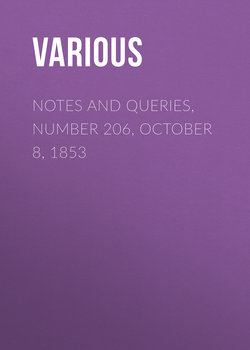Читать книгу Notes and Queries, Number 206, October 8, 1853 - Various - Страница 4
Notes
FRENCH VERSE
ОглавлениеIn the Diary of T. Moore I lately read, with some surprise, the following passages:
"Attended watchfully to her [Mdlle Duchesnois] recitative, and find that in nine verses out of ten 'A cobbler there was, and he lived in a stall' is the tune of the French heroics."—April 24, 1821.
"Two lines I met in Athalie; how else than according to the 'Cobbler there was,' &c., can they be repeated?
'N'a pour servir sa cause et venger ses injures,
Ni le cœur assez droit, ni les mains assez pures.'"
—May 30, 1821.
Now, if this be the mode of reading these lines, I confess all my ideas are erroneous with respect to French poetry. I have always considered that though hemistichs and occasionally whole lines occur in it, which bear a resemblance to the Spanish Versos de Arte Mayor, the anapæstic measure of "A Cobbler" is quite foreign to it. I may, however, be mistaken; and it is in the hope of eliciting information on the subject that I send these few remarks to "N. & Q." Should it appear that I am not wrong, I will on a future occasion endeavour to develop my ideas of the French rhythm; a subject that I cannot recollect to have seen treated in a satisfactory manner in any French work.
Bishop Tegnér, the poet of Sweden, seems also to have differed in opinion with Moore respecting the rhythm of French poetry, for he compares it to the dancing of a deaf man, who forms his steps accurate, but who does not keep time. Both are alike mistaken, in my opinion; and their error arises from their judging French poetry by rules that are foreign to it. The rhythm of French verse is peculiar, and differs from that of any other language.
Thos. Keightley.
